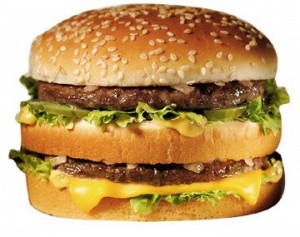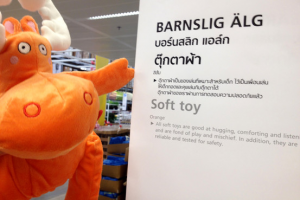 Recent news report from Austrialia that a coroner 32 years after the event rules that in fact the dingo did take the baby. This is the famous case of Azaria Chamberlain, the baby who in 1980 was reported by her partents to have been snatched away by a dingo, the oldest known member of the dog family. There was disbelief at the time that a dingo was capable of carring off a baby and the parents were suspected of either killing their child or letting her die from neglect. The mother was convicted of murder in large part due to her body language after the event. She did not show the kind of grief expected to have been generated by the loss of her only child. On object lesson in the importance of non-verbal communication. It’s not Meryl Streep’s greatest moment in film, but the her representation of the mother in court in the 1988 movie, A Cry in the Dark, demonstrates the problem.
Recent news report from Austrialia that a coroner 32 years after the event rules that in fact the dingo did take the baby. This is the famous case of Azaria Chamberlain, the baby who in 1980 was reported by her partents to have been snatched away by a dingo, the oldest known member of the dog family. There was disbelief at the time that a dingo was capable of carring off a baby and the parents were suspected of either killing their child or letting her die from neglect. The mother was convicted of murder in large part due to her body language after the event. She did not show the kind of grief expected to have been generated by the loss of her only child. On object lesson in the importance of non-verbal communication. It’s not Meryl Streep’s greatest moment in film, but the her representation of the mother in court in the 1988 movie, A Cry in the Dark, demonstrates the problem.
Month: June 2012
Asian-American stereotypes: not just math
 Recent article in the Raw Story: “Asian American families churn out doctors, engineers and graduate students, but their high-achieving image hides a “bamboo ceiling” that marginalizes the fastest growing US minority, experts say.” Asian-Americans tend to rise fast in companies but then have a harder time breaking into top management positions. This has to do, according to the article, that Asian-Americans “are trapped in the cliche of having to be clever — clever to the point of being nerdy, out of touch, and unable to represent mainstream American life.” Going against type may explain in part the immense popularity of Jeremy Lin of the New York Knicks who attended Havard (faithul to stereotype) but then turned out to be a marvellous basketball player.
Recent article in the Raw Story: “Asian American families churn out doctors, engineers and graduate students, but their high-achieving image hides a “bamboo ceiling” that marginalizes the fastest growing US minority, experts say.” Asian-Americans tend to rise fast in companies but then have a harder time breaking into top management positions. This has to do, according to the article, that Asian-Americans “are trapped in the cliche of having to be clever — clever to the point of being nerdy, out of touch, and unable to represent mainstream American life.” Going against type may explain in part the immense popularity of Jeremy Lin of the New York Knicks who attended Havard (faithul to stereotype) but then turned out to be a marvellous basketball player.
Desert chamber music
 Recent NPR story on the music of Sidi Touré And The Sonic Heritage Of The Sahara. Beautiful guitar music – delicate and comples – against the backdrop of a region (city of Gao in Northern Mali in Africa) torn by ethic conflict. His music harkens back to the Songhaï Empire, which ruled the region in the 15th and 16th centuries. Tuareg rebels captured the city of Gao in March and proclaimed a Tuareg homeland that they are calling Azawad. It’s amazing how much great music comes from Mali, much of it going back to ancient traditions, particularly from the Mande Empire. What makes the music today so good and different is the mixture of many ethnic cultures, including French and Arab, that continues to influence Mali musicians.
Recent NPR story on the music of Sidi Touré And The Sonic Heritage Of The Sahara. Beautiful guitar music – delicate and comples – against the backdrop of a region (city of Gao in Northern Mali in Africa) torn by ethic conflict. His music harkens back to the Songhaï Empire, which ruled the region in the 15th and 16th centuries. Tuareg rebels captured the city of Gao in March and proclaimed a Tuareg homeland that they are calling Azawad. It’s amazing how much great music comes from Mali, much of it going back to ancient traditions, particularly from the Mande Empire. What makes the music today so good and different is the mixture of many ethnic cultures, including French and Arab, that continues to influence Mali musicians.
Are French women worried about getting fat?
 Interesting article in the New York Times on efforts by a weight-loss company (Jenny Craig) to see their products and services in France, a cuture not big on pre-packaged cooked foods, especially if they come from a company associated with the home of the Big Mac: “Selling an American-style weight-loss program to France would seem an absurd business proposition: from a French point of view, Americans might appear better equipped to give pointers on how to gain weight than how to lose it. The obesity rate in the United States is around 35 percent, compared with 14.5 percent in France.” But the obesity rate has been rising in France lately as well, although not nearly at the rate of the US.
Interesting article in the New York Times on efforts by a weight-loss company (Jenny Craig) to see their products and services in France, a cuture not big on pre-packaged cooked foods, especially if they come from a company associated with the home of the Big Mac: “Selling an American-style weight-loss program to France would seem an absurd business proposition: from a French point of view, Americans might appear better equipped to give pointers on how to gain weight than how to lose it. The obesity rate in the United States is around 35 percent, compared with 14.5 percent in France.” But the obesity rate has been rising in France lately as well, although not nearly at the rate of the US.
The article points out that the many people in France believe that the traditional French food and eating culture is the answer to obesity. Valérie Bignon, the director of corporate communications for Nestlé France comments: “The solution to America’s weight problem lies in what I call the French food model, a model that is very social, as opposed to the individualist approach of the Americans.” She points to the importance of placing high value on everyone getting together at the same time, eating the same thing, and making meals into a social event, thus discouraging between-meal snacking. She is down not only on American fast food but also on self-serve restaurants (le Self) – which move away from the “French food model”. I have to admit that when I was a student in France, I often ate at self-serve restaurants – they were cheap.
Chinese beer: getting the name right matters
 Today I ate at J.W. Chen’s in South Bend, Indiana. After being seated, the waitress asked if she could bring me something to drink. I ordered the standard Chinese beer imported to the US, “Tsingtao” but used the standard Mandarin pronunciation for 青岛 which is Qīngdǎo. A little later, the owner/chef came out of the kitchen, sat down at my table, asked me what kinds of Chinese food I liked, and suggested a couple of dishes not on the menu. Something similar happened to me a while back at an Asian restaurant in Richmond, where I was eating lunch with my then boss. I again ordered Qīngdǎo. Shortly thereafter, the waiter broght out eating utensils for us, a fork for my boss, and chopsticks for me. Chinese people are so surprised (and delighted) when Westerners try to speak their language and even occassionally get the tones right (a rare occurrence for me), that their perception of you and attitude may change significantly.
Today I ate at J.W. Chen’s in South Bend, Indiana. After being seated, the waitress asked if she could bring me something to drink. I ordered the standard Chinese beer imported to the US, “Tsingtao” but used the standard Mandarin pronunciation for 青岛 which is Qīngdǎo. A little later, the owner/chef came out of the kitchen, sat down at my table, asked me what kinds of Chinese food I liked, and suggested a couple of dishes not on the menu. Something similar happened to me a while back at an Asian restaurant in Richmond, where I was eating lunch with my then boss. I again ordered Qīngdǎo. Shortly thereafter, the waiter broght out eating utensils for us, a fork for my boss, and chopsticks for me. Chinese people are so surprised (and delighted) when Westerners try to speak their language and even occassionally get the tones right (a rare occurrence for me), that their perception of you and attitude may change significantly.
Culture? There’s an app for that
 Gee, all you need for knowing about other cultures, right on your smart phone. The CultureGPS app allows you to call up one of over 100 countries/regions and have a score displayed on how that culture ranks in terms of Gert Hofstede’s five cultural dimensions: power distance, individualism, masculinity, uncertainty avoidance, and long-term orientation. The paid version (25$) allows for comparing the scores of two cultures. In the FAQ on their Web site, they admit that individuals from the target cultures do not necessarily reflect the scores shown, but they don’t mention variations based on region, membership in minority ethnic groups, gender, age, all of which can be significant.
Gee, all you need for knowing about other cultures, right on your smart phone. The CultureGPS app allows you to call up one of over 100 countries/regions and have a score displayed on how that culture ranks in terms of Gert Hofstede’s five cultural dimensions: power distance, individualism, masculinity, uncertainty avoidance, and long-term orientation. The paid version (25$) allows for comparing the scores of two cultures. In the FAQ on their Web site, they admit that individuals from the target cultures do not necessarily reflect the scores shown, but they don’t mention variations based on region, membership in minority ethnic groups, gender, age, all of which can be significant.
On possible cultural change that might affect the accuracy of the information, the FAQ says that “On principle, culture is very stable” but does admit that catastrophic events might cause some variations. I would categorize culture as dynamic and cultural identity as being influenced these days by so many factors, especially on-line roles and personas, that it is a complex issue. Their disclaimer may point to the real usefulness of the app, namely to drum up business for their training seminars: “The information contained in CultureGPS is intended as a guideline and for creating awareness. Proper use can only be assured when having undertaken one of our intercultural management trainings. Its use by those who have not received such training may result in error.”
More minority babies than whites
 According to the US Census Bureau, as of May, 2012, there are more babies being born from ethnic and racial minorities than from whites. This is indicative of a major demographic shift in the United States, consistent with the prediction that by 2050, the US will be “majority minority” (what a strange term), with whites being in the minority.
According to the US Census Bureau, as of May, 2012, there are more babies being born from ethnic and racial minorities than from whites. This is indicative of a major demographic shift in the United States, consistent with the prediction that by 2050, the US will be “majority minority” (what a strange term), with whites being in the minority.
Product names: IKEA in Thailand
Interesting article in the Wall Street Journal on problems Ikea has with using its normal product naming process in other countries. The Swedish names sometimes don’t go over well. In Thai some of the Swedish product names had sexual overtones. Reminiscent of Chevy trying to sell “Nova” (Spanish: no go) cars in Latin America. They would like to keep the Swedish names (often from place names in Sweden) not out of nationalism but to reinforce the Scandinavian origins, with the hope that the association is with quality products. Product names for American products in China is an interesting challenge. The products should sound similar to the name in English but the characters used for the sounds should also have an appropriate and positive meaning. Coca-cola’s name in Mandarin is 可口可乐 (kě kǒu kě lè), with the sound being close and the meaning something like delicious happiness.
